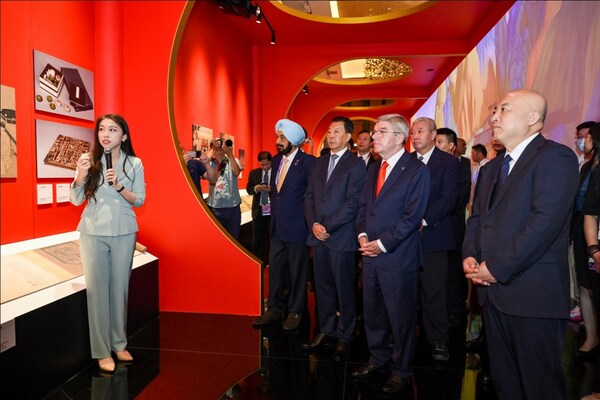BEIJING, Sept. 29, 2023 /PRNewswire/ -- A report from People's Daily: China House, a service complex for the ongoing Hangzhou Asian Games opened on Sept. 22 in Hangzhou, east China's Zhejiang province.

International Olympic Committee President Thomas Bach and Acting President of the Olympic Council of Asia Raja Randhir Singh visit the China House of the Hangzhou Asian Games on the day it opens, Sept. 22, 2023. (Photo by Wang Hailin/People's Daily)
In the 2,000-square meter facility, precious artifacts, texts, images and videos, and interactive technological installations are displayed, showcasing the development of Chinese sports culture and the journey of China hosting the three Asian Games.
In recent days, both domestic and foreign visitors, as well as local residents, have been hitting the China House to learn about the history of the Asian Games and experience traditional Chinese crafts such as fan-making and stone rubbing.
Inside an antique vermilion door, four Chinese characters "Zhong Guo Zhi Jia" which mean "China House" stand out starkly against a painted mountain landscape.
In exhibition hall, the 1990 Beijing Asian Games torch, signed award ceremony uniforms of Olympic champions, and an animated Chinese painting masterpiece "A Thousand Li of Rivers and Mountains" are displayed.
International Olympic Committee (IOC) President Thomas Bach and Acting President of the Olympic Council of Asia (OCA) Raja Randhir Singh were among the first guests of the China House when it opened. They both showed a strong interest in Chinese traditional culture.
In a tea culture exhibition area, Bach tasted tea while learning about the tea-making process. He said he was surprised to learn that tea leaves, apart from being brewed into a drink, can be eaten directly.
China House is a comprehensive service facility organized and operated by the equipment center of the General Administration of Sport of China. Since its establishment at the 2010 Vancouver Winter Olympics, China House has been one of the favorite service facilities for Chinese athletes during major international multi-sport events such as the Olympic Games and the Asian Games.
"The connotation of the China House has become increasingly enriched, and it has now become a window for promoting Chinese culture," said Yu Jianyong, director of the equipment center of the General Administration of Sport of China and director of the market development department of the Chinese Olympic Committee.
After more than 10 years of continuous exploration, China House has built a platform for promoting the spirit of Chinese sports and showcasing the image of China. While promoting exchanges and mutual learning among different civilizations, it has gradually become familiar with and welcomed by the international sports community, Yu noted.
The China House at the Hangzhou Asian Games has set up an interactive area for national fitness for the first time, where a domestically developed smart sports system connects sports hardware with servers, and two large electronic displays present real-time outdoor sports scenes. Participants can join a cycling challenge without leaving their homes.
Adjacent to the interactive area, there is a skeleton training system, the same one used by the Chinese national skeleton team in the Beijing Winter Olympics. It enables ordinary people to experience the speed and excitement of the Winter Olympics on a 1:1 modeled Winter Olympics skeleton track.
The China House is becoming increasingly popular and attractive. It gives everyone the opportunity to appreciate the beauty of Chinese sports, culture, and technology.











